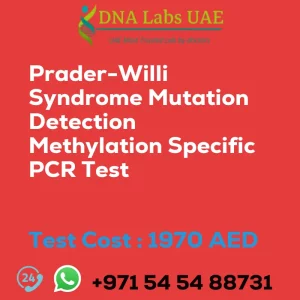Prader-Willi Syndrome Karyotyping and FISH Test
Test Name: Prader-Willi Syndrome Karyotyping and FISH Test
Components: Sodium heparin Vacutainer (2ml)
Price: 1650.0 AED
Sample Condition: Peripheral blood
Report Delivery: 7-10 days
Method: Cell Culture + FISH
Test Type: Genetics
Doctor: Gynecologist
Test Department: Pre Test Information
Prader-Willi Syndrome (Karyotyping + FISH) can be done with a Doctor’s prescription. Prescription is not applicable for surgery and pregnancy cases or people planning to travel abroad.
Test Details
Prader-Willi Syndrome (PWS) is a rare genetic disorder caused by the loss of function of specific genes on chromosome 15. It is typically diagnosed through a combination of karyotyping and fluorescence in situ hybridization (FISH) techniques.
Karyotyping is a laboratory technique that involves examining an individual’s chromosomes under a microscope. It allows for the visualization of the size, shape, and number of chromosomes in a person’s cells. In the case of PWS, karyotyping can help identify any abnormalities in chromosome 15, such as deletions or translocations.
FISH is a molecular cytogenetic technique that uses fluorescent probes to bind to specific regions of DNA. In the case of PWS, FISH can be used to specifically detect the absence or deletion of the critical genes on chromosome 15. This technique involves labeling the DNA probes with fluorescent dyes, which can then be visualized under a fluorescent microscope. The absence or deletion of the specific genes on chromosome 15 can be detected by the absence or reduction of the fluorescent signal.
By combining the results of karyotyping and FISH, healthcare professionals can confirm a diagnosis of Prader-Willi Syndrome. It is important to note that these techniques are typically performed on a blood sample or other tissue samples, and they are not invasive or harmful to the individual being tested.
In addition to karyotyping and FISH, other genetic testing methods, such as DNA methylation analysis or array comparative genomic hybridization (aCGH), may also be used to diagnose PWS and determine the specific genetic abnormalities present. These tests can provide further information about the specific genetic changes involved in the syndrome.
| Test Name | Prader-Willi Syndrome Karyotyping and FISH Test |
|---|---|
| Components | Sodium heparin Vacutainer (2ml) |
| Price | 1650.0 AED |
| Sample Condition | Peripheral blood |
| Report Delivery | 7-10 days |
| Method | Cell Culture + FISH |
| Test type | Genetics |
| Doctor | Gynecologist |
| Test Department: | |
| Pre Test Information | Prader-Willi Syndrome (Karyotyping + FISH) can be done with a Doctors prescription. Prescription is not applicable for surgery and pregnancy cases or people planing to travel abroad. |
| Test Details |
Prader-Willi Syndrome (PWS) is a rare genetic disorder caused by the loss of function of specific genes on chromosome 15. It is typically diagnosed through a combination of karyotyping and fluorescence in situ hybridization (FISH) techniques. Karyotyping is a laboratory technique that involves examining an individual’s chromosomes under a microscope. It allows for the visualization of the size, shape, and number of chromosomes in a person’s cells. In the case of PWS, karyotyping can help identify any abnormalities in chromosome 15, such as deletions or translocations. FISH is a molecular cytogenetic technique that uses fluorescent probes to bind to specific regions of DNA. In the case of PWS, FISH can be used to specifically detect the absence or deletion of the critical genes on chromosome 15. This technique involves labeling the DNA probes with fluorescent dyes, which can then be visualized under a fluorescent microscope. The absence or deletion of the specific genes on chromosome 15 can be detected by the absence or reduction of the fluorescent signal. By combining the results of karyotyping and FISH, healthcare professionals can confirm a diagnosis of Prader-Willi Syndrome. It is important to note that these techniques are typically performed on a blood sample or other tissue samples, and they are not invasive or harmful to the individual being tested. In addition to karyotyping and FISH, other genetic testing methods, such as DNA methylation analysis or array comparative genomic hybridization (aCGH), may also be used to diagnose PWS and determine the specific genetic abnormalities present. These tests can provide further information about the specific genetic changes involved in the syndrome. |








